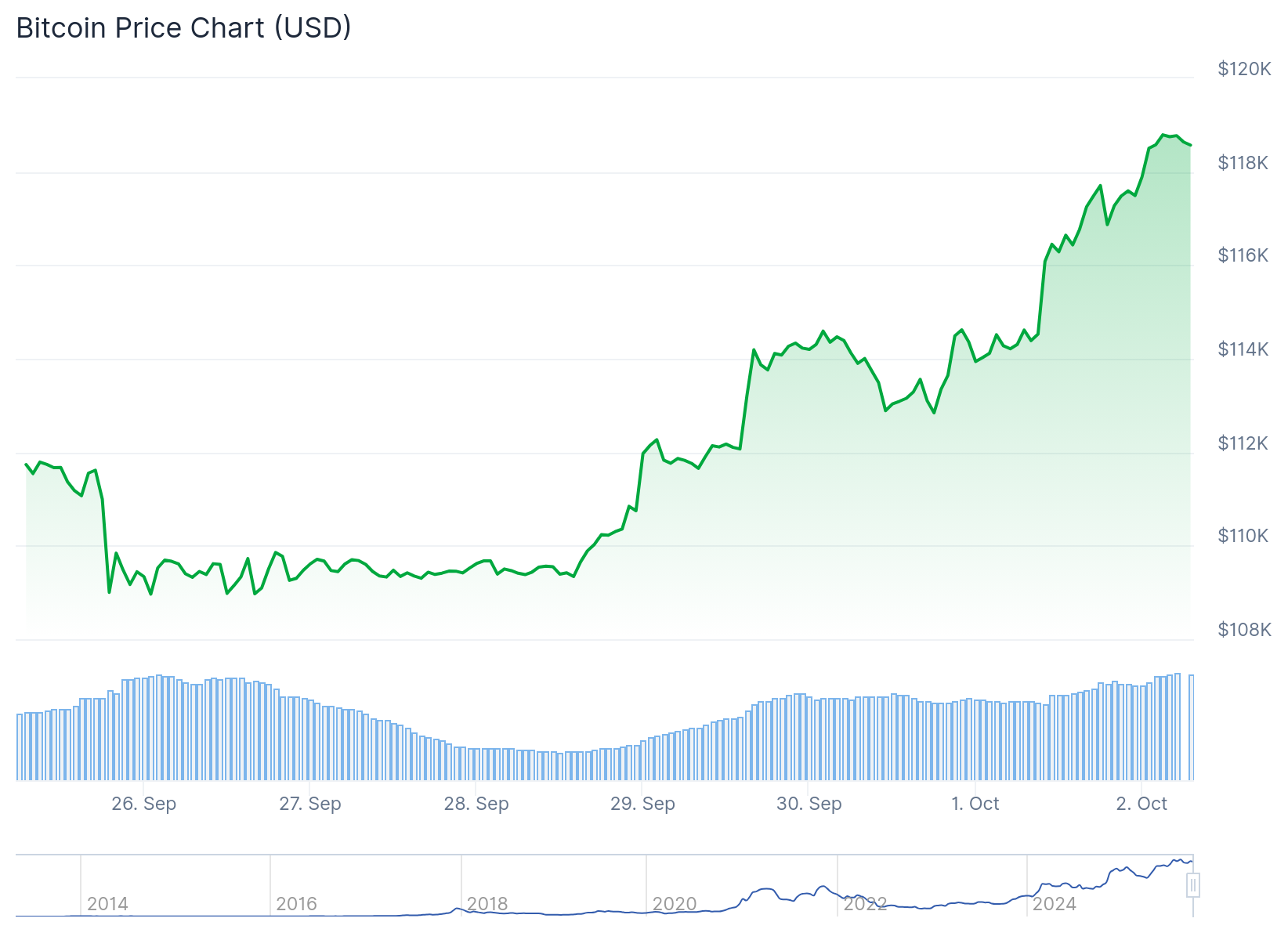TLDR
- Bitcoin climbed 2.9% to $119 as the US government entered its first shutdown since 2018
- Coinbase proposed a $300 tax exemption for small crypto transactions to promote mainstream adoption
- Senator Elizabeth Warren claimed crypto holders underpay $50 billion in annual taxes and opposed exemptions
- Analysts predict the shutdown could signal a crypto market bottom based on historical patterns
- Gold also rose 0.7% as investors shifted to safe-haven assets during political uncertainty
The US government shutdown has sparked renewed debate over cryptocurrency taxation while pushing Bitcoin prices higher. The Senate Finance Committee held hearings on crypto tax policy the same day federal operations ceased due to a partisan funding dispute.
Bitcoin traded at $119,000 following a 2.9% increase in 24 hours. Gold prices also climbed 0.7% as investors sought protection from political uncertainty. The dual price movements suggest growing demand for assets outside traditional government control.

Lawrence Zlatkin from Coinbase testified before the Senate committee about crypto tax reform. He requested a de minimis exemption for cryptocurrency transactions under $300. This exemption would align crypto with existing foreign currency tax treatment.
The Coinbase executive argued current tax rules discourage using crypto for everyday purchases. He stated that identical tax rules should apply to similar economic activities regardless of whether they involve stocks, commodities, or blockchain tokens. The absence of appropriate regulations pushes innovation outside US borders.
Warren Challenges Crypto Tax Benefits
Senator Elizabeth Warren opposed creating special cryptocurrency tax exemptions. She stated that crypto holders already avoid paying at least $50 billion in annual taxes. Warren warned that exemptions would push investors away from other asset classes toward crypto solely for tax advantages.
The Joint Committee on Taxation calculated the proposed $300 exemption would deliver $5.8 billion in tax benefits to crypto investors. Warren linked tax exemptions to money laundering risks. She argued exemptions could help individuals evade US sanctions and avoid Financial Crimes Enforcement Network monitoring.
The Massachusetts senator insisted crypto transactions should follow existing tax frameworks for securities and commodities. She rejected any special treatment for digital assets.
Political Standoff Halts Government Operations
The government shutdown resulted from disagreements over a continuing resolution funding bill. Republicans moved forward without policy additions requested by Democrats. Senator Chuck Schumer demanded permanent Affordable Care Act tax credit extensions affecting healthcare coverage for millions.
This marks the first government shutdown since the 35-day closure in December 2018. The dispute centers on fundamental partisan divisions preventing passage of the 2026 fiscal year funding bill.
Ryan Lee from Bitget told Cointelegraph the shutdown could benefit Bitcoin and the S&P 500. Government shutdowns typically lead to lower interest rates. Lee explained Bitcoin’s independence from government and political uncertainty attracts traditional investors.
Lee believes most promising altcoins have reached bottom. Bitcoin holding above $116,000 entering October, historically a strong month for crypto, sets a positive tone.
Previous government shutdowns produced mixed market reactions. Stocks fell while Bitcoin rallied during the 2013 shutdown. Both equities and Bitcoin dropped during the 2019 shutdown.
The Federal Reserve typically adopts dovish interest rate policies following shutdowns. The S&P 500 averaged 13% annual gains after past shutdowns according to the Kobeissi Letter.
Polymarket traders give a 38% probability the shutdown ends by October 15. Congressional divisions over the funding bill and policy requirements leave the shutdown duration uncertain.
The Senate Finance Committee also discussed closing the $700 billion annual tax gap. Lawmakers considered stricter reporting requirements for crypto transactions and classifying staking service revenue as earned income under the tiered tax system.





